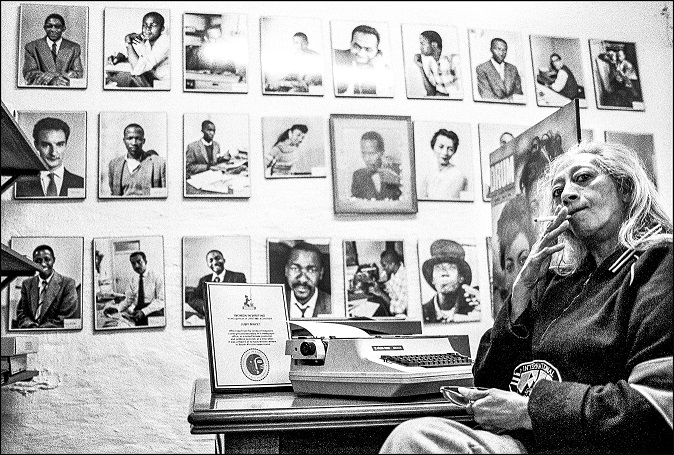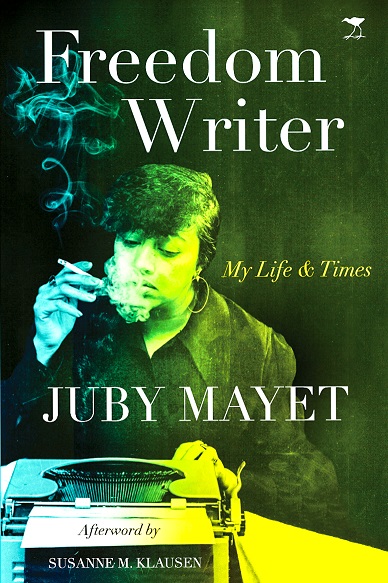“I WAS doing something no Malay girl had ever done before me […] I was a reporter on a “naytiff”[sic] paper, and I was seen all over the place in the company of “naytiffs” eating with them, walking and talking with them, partying with them and jislaaik!
Coming home with them in open-top convertible Cadillacs!
And ‘sleeping’ with them, the narrator could as well had added regarding the juncture where she had to share a stretcher with a “naytiff” (native) male colleague for shuteye at the house of another of their colleague, after she was unable to make it home!
Understandably having lied down with trepidation owing to the awkwardness of the implication – she was to awake the following morrow “rather stiff, but untouched!”
These depicted scenarios unfolded around 1950s Joburg during Apartheid-era South Africa!
The narrator went by the moniker Sharon Davis – Sharon borrowed from the biblical, ‘rose of Sharon’ and the Davis part adopted from the family name of the Rat Pack crooner, Sammy Davis Jr. – a nom de plume she opted to enter a news publication’s short story contest by.
Adjudged a runner-up in a competition contested by already established wordsmiths such as Bessie Head, Peter Abrahams and Richard Rive, ‘Davis’, then still a high school student, had no inkling whatsoever that her feat was to serve as a marker as to her future career destiny!
But reaching that destiny, viz journalism, would still take a while arriving at – with her having to initially navigate the ‘itinerary’ (thus deemed since she never got to practice) of qualifying as an educator.
The news media pull became expedited when a then boyfriend (later to become her husband) voluntarily took her, sans her prior knowledge, to the offices of reputable news publications pending which impromptu visit, she found herself rendered gobsmacked in a newsroom teeming with the journalism household names of the era!
Her journalistic ‘calling’ commenced whilst she was still winding down teacher’s training studies and simultaneously freelancing for one of the publication’s titles after she had been offered a job as a cub reporter. So sure was the hierarchy of the entity regarding her prospects that its head honcho himself and associates visited ‘Davis’’ parents at their home to effectively headhunt her!
The visit and the deliberations between the two parties effectively put paid to the likelihood of a career in teaching for her and served to signal the greenlight for one as a journalist for her!
The preceding constitutes the intro into how Zubeida Sallie, a.k.a. Juby Mayet or Sharon Davis – entered the world of South African journalism. An industry in the 1950s epitomized by the “live fast, die young and have a good-looking corpse” mantra adopted from Willard Motley’s 1947 tome, Knock on Any Door.
Mayet’s is a memoir of a Malay woman who whilst young came of age in Fietas, the neighbourhood on the outskirt of Johannesburg reserved for Asians under the then prevailing apartheid system’s Group Areas Act.
Her childhood ticked the familiar boxes: a teenage love affair – albeit with a boy of another colour (race) and nightly starry-eyed kiss-and-hug assignations; carefree indulgence in shenanigans involving bunking school for escapades at a popular socializing joint to swig on soft drinks, munch on chocolates and chips and jiving with a boyfriend to the beat of Elvis Presley’s Jail House Rock booming from a jukebox; repetitive whirling of a love song vinyl on the family gramophone, et cetera.
At a very young age, she was thrust into the role of ‘little mother’ when she had to take care of nine siblings from both her biological father and step-father’s sides. (She was to beget eight children herself later on.) Her large family was always moving from one residence to another invariably in response to segregationist prohibitions and socio-economic challenges.
Her anecdotes from those surreal years abound with envy-inducing experiences and are laden with mindboggling names-dropping! She hobnobbed with none other than the movie cast-esque “Drum Boys”, viz, Bloke Modisane, Can Themba, Todd Matshikiza, Arthur Maimane, Lewis Nkosi, et cetera – in addition to the complement of pioneering photographers, Peter Magubane, Bob Gosani and Alf Kumalo!
Just so as to imagine the caliber of literary talents she was counted worthy amongst, Nkosi, under whose wing Mayet penned her first front-page story for the Golden City Post, described Drum’s scribes as “the new Africans cut adrift from the tribal reserve – urbanized, eager, fast-talking and brash!”

Another notable literary figure who briefly entered her orbit was Sinclair Beiles – the South African beat poet (momentarily associated with beatniks, Allen Ginsberg and William S. Burroughs) who emerged on the international literary scene in 1950s Paris – with whom she met in 1964 to plot the escape of her journo friend, Maggie Smith, from a police station after she had been detained under the 90-day law.
“In the end,” Mayet pointed out, “our plotting came to naught.”
With the cover of the 212-page paperback tome featuring Alf Kumalo’s image depicting ‘Sharon Davis’ dutifully clacking away at a typewriter’s keyboard with one hand whilst appearing poised with a cigarette in another – the depiction evokes just which sort of articles the wordsmith wrote.
For her account is riddled with incidents of the commonplace contravention of the Immorality Act, in place then: her complicity in the smuggling of a Coloured man and his Afrikaner wife into a neighbouring country devoid of segregation and the White police officer who begot an illegitimate child with a streetwalker of a converse hue – among numerous others.
Owing to the racially oppressive environment within which Mayet practiced her craft – it inevitably led to her involvement with the Union of Black Journalist, in the aftermath of the June 16, 1976 Students Uprisings. Such an activity precipitated incarceration and a banning order for her – spells which led to extended periods of separations from her children.
Freedom Writer: My Life & Times is published by Jacana Media.
Available at leading bookstores across South Africa, it retails for R280.

